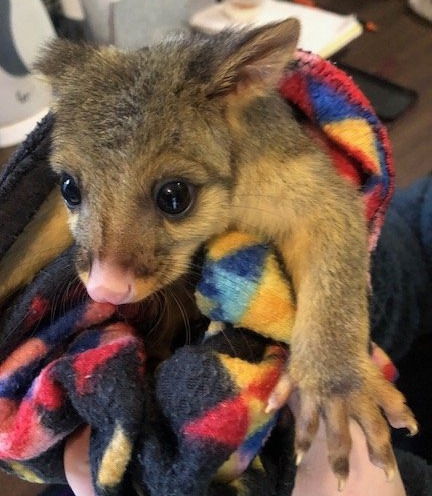A Rewarding Author Pastime: Helping wildlife

The life of an author, with flexible work hours, provides the perfect lifestyle to help wildlife in need.
My characters won’t complain (too much) if I suddenly abandon them and dash out the door to rescue a possum or bird, or pouch check a deceased marsupial.
I've rescued wildlife from renovation sites when their habitat was removed, transported fledglings and baby possums from vets to carers, searched parks for ducklings who lost their mother to a speeding car, or for a limping duck tangled in fishing line (and was nearly netted by another rescuer when I played duck calls on my mobile). I've also bailed out a cockatoo from a police station (cell number 5) where he was held after being turned in for vagrancy, wandering the road.
Many don't make it, but the success stories are heartwarming.
Recently, when I delivered a brushtail possum to a carer, she said, "I have one of your rescues here." She handed me a vet admission form I'd filled out 10 days earlier, and pointed to a possum pouch suspended among native foliage in one of her indoor enclosures. "She has two friends now." Carers try to buddy up orphans so they're not alone. I went to the cage and a baby ringtail emerged from the pouch and climbed towards me. I like to think she remembered me and she came to say hello.
Setting up our garden as a wildlife haven is also a rewarding experience.
My partner and I share our place with all the wildlife we can entice with native plantings, nesting boxes, birdbaths and ponds.
It’s a delight to see a nose, paw or tail poking out of a nesting box, monitor the tadpoles growing in our ponds, hear the splash of birds enjoying a bath, or have a feathered face peer in the window while I write.
Postscript.
If you see wildlife in need, there are many wildlife rescue services you can contact for advice and help.
Since becoming a wildlife volunteer (rescuing and transporting the orphaned and injured to vets and carers) I’ve attended about 200 cases. None, so far, due to natural causes. So I’ve compiled a list of common reasons I’ve learned about how wildlife can end up in trouble (or dead), and small things we can all do to help:
Dehydrated: Please put out water for wildlife.
Hit by car: Take extra care on roads at dawn, dusk and night, and keep within speed limits.
Cat and dog attacks: Please keep pets contained and keep cats inside at night (for their safety too). Cats kill millions of native fauna each year. Also, cat scratches easily become infected.
Poisoned: Please don’t use poisons. Snail and rodent baits are deadly hazards to native animals, birds and reptiles. And accidental poisoning of pets is unfortunately too common.
Entangled in rubbish: Dispose of rubbish carefully and cut any risky rings and strings. Bottle top rings, hairbands, covid masks strings, and fishing line can entangle wildlife, twisting and strangling around legs and necks.
Displaced from habitat: If tree chopping is required for safety please think about providing a replacement nesting box home for any resident wildlife.
Bird Napping: Some fledglings can’t make it back to the nest when first learning to fly. It’s normal to be temporarily on the ground. Check for parent birds and keep pets away. Only intervene if necessary (e.g. return to nest if able to do so safely or provide a makeshift replacement).